Inspections at fish slaughterhouses by a government agency are now a mandatory requirement, The Ferret can reveal.
The Animal, Plant and Health Agency (APHA) – a UK Government agency responsible for safeguarding the health of animals – said Scottish salmon firms slaughtering fish would be monitored from the 1 February 2022.
The news was revealed to campaign group Animal Equality in response to a freedom of information (FoI) request it submitted to APHA.
Animal Equality welcomed the step as “a move in the right direction” but argued it does not go “nearly far enough”. It is calling for legislation to ensure that CCTV is installed in every fish slaughterhouse in the UK, due to animal welfare concerns.
Salmon Scotland — which represents the farmed salmon industry — said in reply that “fish welfare is central to everything Scotland’s salmon producers do” and that CCTV is already used by every “harvest station”
The Scottish Government said the UK Animal Welfare Committee (AWC) is currently considering this issue and that it would “explore the need for any changes to current practice or legislation” once the committee’s findings have been published.
In February 2021 Animal Equality released a video after an undercover investigation into an onshore fish abattoir operated by The Scottish Salmon Company. It showed fish having their gills cut while still conscious and being clubbed by workers and left to asphyxiate on the ground.
This step is a move in the right direction – and we expect the rest of the UK to follow suit – but in reality it doesn’t go nearly far enough. Fish must be given detailed and specific protections in law and CCTV must be mandated in abattoirs. It’s the very least we can offer these already vulnerable animals
Jenny Canham, of Animal Equality UK
The campaign group said its footage revealed “extremely serious animal welfare abuses”.
The video led to scientists and academics calling for CCTV to be made mandatory for all slaughterhouses, as reported by The Ferret. In an open letter to the AWC — which advises the Scottish Government on welfare issues — 25 signatories called for “regular, frequent, and unannounced inspections” at fish slaughterhouses in Scotland, and across the rest of the UK.
The letter was organised by Animal Equality last December. A few weeks later, in January, the campaign group submitted a FoI request to APHA asking if inspections were taking place to monitor animal welfare at fish slaughterhouses.
The FoI reply from APHA said: “From the 1st February 2022, the Scottish Government (SG) animal welfare policy requires APHA Scotland to commence visits to monitor fish welfare at slaughter. For this first year, it is one visit for each major salmon company carrying out onshore processing.”
Jenny Canham, of Animal Equality UK, welcomed the move but said there is a “disturbing lack of oversight” in the aquaculture industry, which leads to fish experiencing “extreme and prolonged suffering”.
She added: “This step is a move in the right direction – and we expect the rest of the UK to follow suit – but in reality it doesn’t go nearly far enough. Fish must be given detailed and specific protections in law and CCTV must be mandated in abattoirs. It’s the very least we can offer these already vulnerable animals”.
Professor Culum Brown, of Macquarie University and assistant editor of the Journal of Fish Biology, said consumers are increasingly concerned about animal welfare in food production. “The process of slaughter is arguably one of the most important processes to ensure minimum pain and suffering occurs at the time of death,” he added.
We have always welcomed measures designed to support this sector-leading position on animal welfare and are happy to engage with any organisation wanting to learn about how today’s salmon sector operates.
Salmon Scotland
“While rules and regulations may stipulate how the slaughter process should occur, without adequate monitoring there is room for complacency leading to poor welfare outcomes.”
Explaining that fish are intelligent, sentient beings, Brown argued there is a “moral obligation to ensure we do everything in our power to reduce animal suffering wherever we may encounter it”.
A spokesperson for Salmon Scotland said: “Fish welfare is central to everything Scotland’s salmon producers do, right through to humane harvesting. As such, each producer adheres to RSPCA welfare standards, which include CCTV recordings in each dedicated harvest station and regular on-site inspections – measures that have been in place for some time now.
“We have always welcomed measures designed to support this sector-leading position on animal welfare and are happy to engage with any organisation wanting to learn about how today’s salmon sector operates.”
The Scottish Salmon Company declined to comment.
CCTV and Fish Welfare
A Scottish Government spokesperson said ministers take the welfare of farmed animals very seriously and recently introduced measures to monitor fish welfare at slaughter.
When asked about a law to make CCTV mandatory, they added: “The UK Animal Welfare Committee is currently considering this issue and we will explore the need for any changes to current practice or legislation once the committee publishes its findings.”
A spokesperson for the Department for Environment, Food and Rural Affairs — commenting on behalf of APHA — claimed the UK has some of the highest animal welfare protections in the world, “including when animals are slaughtered or killed”.
They added: “We are carefully considering issues raised in the review of the Welfare of Animals at the Time of Killing (England) Regulations, including detailed protections for the welfare of farmed fish.”
Photo Credit: Creative Commons














